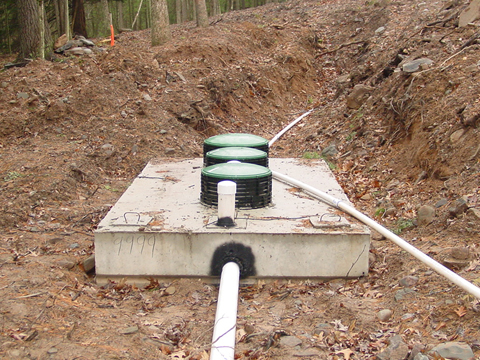News

How to Properly Maintain Your On-lot Septic System
In more densely developed urban and metropolitan areas, household wastewater is commonly piped off-site to a centralized sewage treatment plant.
The infrastructure required for centralized systems is often impractical and financially prohibitive in rural areas characterized by more widely scattered residential development.
Like much of rural Pennsylvania, a majority of Pike County residents rely on individual, on-lot sewage systems to treat household wastewater. These homeowners have small-scale sewage treatment plants right in their own yards. It is the homeowner’s responsibility to ensure the proper use and maintenance of their system.
Traditionally, on-lot septic systems consisted of a holding or septic tank and an in-ground soil absorption field. Septic tanks remain a mainstay in on-lot systems. In-ground absorption fields are seldom used in Pike County today.
Absorption Fields
The right type of soil at sufficient depth must be present for in-ground absorption fields to work. These conditions are not present in much of Pike County. Shallow, rocky, poorly drained soils predominate.
In-ground soil absorption fields now often fail to meet the regulatory criteria set by the Pennsylvania Department of Environmental Protection (PA DEP). Regulations provide for more effective and safer on-lot wastewater treatment.
Specially designed above-ground absorption fields called elevated sand mounds or “turkey mounds” are now widely used in place of in-ground absorption fields. These are a fixture of community landscapes in Pike County.
There are several benefits to properly maintaining your on-lot system, including:
- Minimizing pollution to surface and groundwater
- Providing a safeguard for family health by helping to reduce contamination of drinking water supplies and public swimming areas
- Protecting your financial investment in your home and property
Pump the Tank Regularly
The most critical aspects of maintaining an on-lot system are regular inspections and pumping the tank. It is a good rule of thumb to pump the tank every three years.
Here are a few other measures you can take to maintain its integrity and functionality:
- Exercise caution with the use of additives marketed as providing improvement to on-lot systems. Some products can actually create problems in on-lot systems.
- Use and dispose of household hazardous wastes (HHW) properly. Excess amounts of HHW poured down household drains can impair on-lot system functioning and may lead to groundwater contamination.
- Properly dispose of grease and cooking oils. If poured down household drains, they can accumulate in a septic tank and contribute to a clogged absorption field.
- Maintain a grass cover over an absorption field. The root systems of shrubs and trees, planted over absorption fields, can penetrate, clog and damage distribution pipes. Keeping woody plants from growing over a field is a safe bet.
- Avoid parking or driving automobiles, ATVs and other vehicles over absorption fields. Their weight can cause compaction and damage to distribution pipes. Average-sized riding mowers should be fine.
- Avoid placing large, inflatable swimming pools on absorption fields; their weight can cause compaction of mound materials resulting in system failure.
- Practice water conservation measures to avoid overloading and saturating an absorption field, which can lead to system failure.
Help for Improperly Functioning Systems
Negligence in maintaining a system can lead to system failure, water pollution and expensive repair costs. Financial assistance in the form of low interest, long-term loans for replacement or repairs of improperly functioning or failed on-lot systems is available through the Pennsylvania Infrastructure Investment Authority.
For more information about on-lot sewage treatment systems, contact the Conservation District or consult some of the following sources:
Your Local Sewage Enforcement Officer (SEO)
